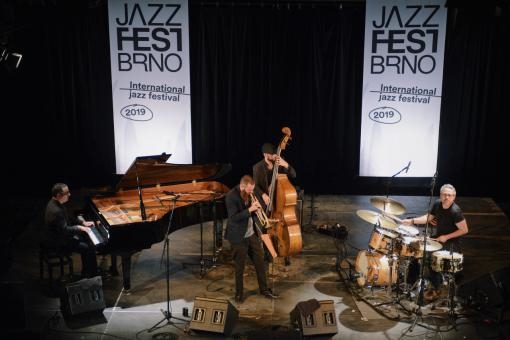This year's JazzFestBrno festival had several highlights – of course, it depended on each visitor's personal taste, their expectations, and of course on how many shows they managed to visit. For the author of this article, one of the highlights the evening with bassist Stanley Clark on 23 April, varied in genre and arrangement, as well as the last but one concert of the festival, the performance of "the other" Avishai Cohen in the Husa na provázku Theatre on 28 April. It was a musically pure essence of jazz with a message – imperative, heartbreaking and poetic.
Poetry in general intermingled throughout the entire evening, though Cohen recited (in English) only one real poem at the very conclusion of his concert. However, the four-member Norwegian-Czech band NOCZ performed before of the Israeli quartet, accompanied by a ten-headed choir led by Jana Vondrů. In this case, the choir does not mean a classical vocal ensemble, but rather a voice band moving somewhere between the avant-garde theatre and alternative rock music (Ošklid by Petr Váša). The choir, which worked with screams, laughter, inarticulate sounds, or individual tones rather than words or syllables, together with a jazz band without a harmonic instrument, created a particular type of a fourteen-member big band. Improvisation plays an important role in NOCZ's music, enhanced in this case by double conducting (the choir was firmly in the hands of Jana Vondrů, but the trumpeter and author of the project, Didrik Ingvaldsen, conducted the whole ensemble with small inconspicuous gestures).
NOCZ and the choir presented their new project Sailor on Dry Land, named after a poetry collection of the Spanish avant-garde poet Rafael Alberti, whose death (he passed away twenty years ago at the age of 96) we are commemorating this year. Alberti's surrealistic poetry, related to the exile fight against Franco's regime in Spain, inspired Ingvaldsen to compose music for a new album that should soon be released by the Hevhetia label. The co-author of the project is the Czech saxophone player Radim Hanousek, who contributed to the album, among other things, with his versatile and improvisation-based composition Spolu 2 [Together 2].
The music that NOCZ plays represents a high level of performing (Marian Friedl, another versatile musician with experience, among others, with folklore and world music plays the double bass), but it is not fully forthcoming to listeners hearing it for the first time. This was strengthened by both the unconventional concept of vocal jazz and the fact that the vast majority of listeners did not know the inspirational source of the project, i.e. Alberti's poetry, and could not understand how Ingvaldsen was transforming the poems, though surrealistic, into the abstract language of music. On the other hand, the communication between the members of the choir and between them and the musicians did not lack elements of musical and situational humour, which, in combination with instrumental performance made the NOCZ's free jazz become a truly interesting experience.
However, what most of the visitors expected came only after the intermission (unless someone mistakenly came to see Avishai Cohen – the double bass player who will perform in Prague in May and has appeared in Brno several times already). Brno's premiere of Cohen's not any less interesting namesake, the Israeli trumpeter Avishai Cohen, who released his last two albums under the prestigious ECM label, raised great expectations. The organisers of JazzFest Brno rightly placed his bearded face on the cover page of the luxury Jazzman magazine, which was available for free at all festival concerts. In an interview inside the magazine, the trumpeter introduced himself as an author and a player who tries to fight the wrongs of the contemporary world with his music: " In my music, I try to look for an answer to the question of what our role is as citizens of the worldwide community."
The Israeli trumpeter appropriately started the concert with perhaps his strongest composition – the long, wistful yet still energetic ballad "Will I Die, Miss? Will I Die?" from his latest album, Cross My Palm with Silver, inspired by the suffering of children in the war in Syria. Then he played additional strong compositions from the same album such as Shoot Me in the Leg and a shorter but no less remarkable Theme for Jimmy Greene. From the previous album we heard the opening composition Life and Death, and the theme of death – not only in the war – was present throughout the whole concert until the above mentioned (almost) final poem.
This does not mean, however, that Cohen's concert was grim or sad. Yes, compared to the comedian character of the NOCZ Choir, it was certainly more serious, more based on the traditional work with solos and the performance of the whole band (trumpet + piano trio), but the range of emotions that Cohen was able to express with his trumpet was incredibly broad. Even though the concert had a clear soloist, the performance of the other three players was also worth attention – especially the drummer Ziva Ravitz, who is himself a frontman of his own trio, and the pianist Yonathan Avishai, Cohen's long-time companion, who alternated his high-quality solos with almost a childish play with chords – in fact, there was an element of humour, with which the Cohen's Quartet followed up on the NOCZ.
If Avishai Cohen came to the stage, played the opening song "Will I Die, Miss? Will I Die? " and left, it would already have made up for an excellent concert. However, the Israeli trumpeter and his band kept the bar high throughout the entire evening, and for some listeners (the author of this article overheard this opinion immediately after the concert) surpassed his namesake, who is very popular in Brno.
NOCZ & choir (Norway/Czech Republic), Avishai Cohen Quartet (Israel), 28 April 2019, Brno, Husa na provázku Theatre (as part of the JazzFestBrno festival).
































No comment added yet..